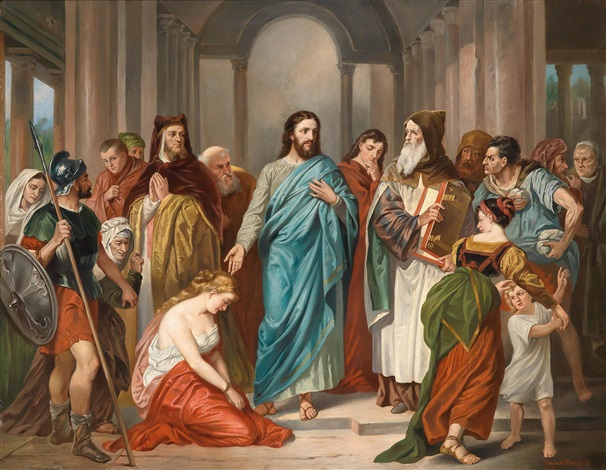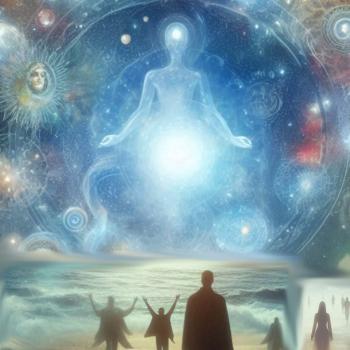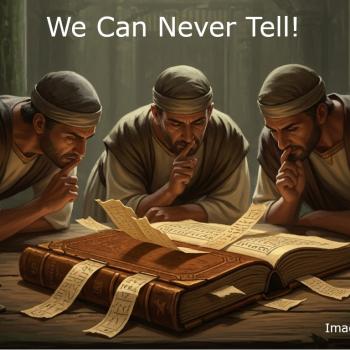Practical Spirituality series
Some Scribes who kept the written law for their communities, and Pharisees who interpreted the Law according to their perspective, were always trying to trap Jesus. One day, as Jesus came to the Temple, they brought a woman before Jesus who was caught in the act of adultery. They made no mistake about this: According to Biblical law, adultery was an offence punished by stoning to death. Guilt was undeniable. They asked Jesus to weigh in on this.

Jesus stooped to the ground and wrote. We don’t know what he wrote, but judging from the delayed reaction, it was probably several commandments from the Bible. They were literate people who were well versed in scripture, so Jesus didn’t have to say the verses aloud or elaborate on them. They each knew what they had done in the past.
Midway, Jesus rose and said to them, “He who is without sin among you, let him be the first to throw a stone at her.” Then he stooped again and continued writing in the dirt.
Moments later, he looked up and asked where her accusers were. “Did no one condemn you?” She said, “No one, Lord.” And then Jesus said, “I do not condemn you, either. Go. From now on sin no more.” (John 8: 1-11 (NASB).)
Walking classes in school
High schools now offer “walking classes.” I think that’s a good thing. It’s even better exercise than sitting in class trying not to learn. I’m thinking there should be grades.
For those folks who just lean forward and catch themselves, or falter along, that style is an automatic D for presence and lack of effort.
For the leisurely walkers, those who meander, stroll, amble, or mosey, they should get a C. Show some initiative people. Put your brain on hold and move your arms and legs, and maybe get a B. Flap your arms and tell people you identify as an airplane. Identifying is now huge.
B should go to the power walkers who put a lot of initiative and energy into it.
An A should be reserved for those who skip, hop, jump, side step, side skip, side hop, dance, or do other cool maneuvers. These show more style, initiative, and energy. Exercise can bring out the creativity in us. They should walk to music. Music gets the entire body involved.
I should run the schools. Although in elementary school I told my mom I didn’t want to make As because it might become an expectation. I just wanted to skate through. Maybe I shouldn’t run the schools.
What about those who won’t do anything?
Some choose to sit on the sideline and complain, giving every excuse imaginable for not moving. They encounter two problems. First, they don’t want to cooperate or learn anything. Second, by not participating, they learn nothing from the experience. They’re flunking life. We should give them a B for all the harsh realities life has thrown at them and recognize them at a banquet. Jesus said, go into the streets and alleys of the town and bring in the poor, disabled, lame, and blind to banquets (Luke 14:12-24).
Wait a minute! We honor those whose performance is outstanding or acceptable. Not the troublemakers and loafers.
We don’t get the struggles others go through unless they’re visibly mistreated.
Few of us have to tackle the obstacles in their lives. They endure things like low self-esteem, abuse, and bad parenting. Some feel no one understands them. They have poor relationships with family, no friends, and teachers who hate them. Their peers say school is useless. They endure anxiety, depression. They feel they don’t have any competence or skills, and they have conditions no one understands. That’s harsh. That’s difficult.
My wife, and sometimes myself, work with a wide range of people. Some of the horror stories she tells me about kids she works with are unimaginable. The things these children have to overcome in life are things that would crush many of us. Yet many of them overcome.
Several people close to me have endured physical and mental abuse, and many have been in dire need at times. I’ve experienced enough of this to know how difficult it is to handle. They overcome.
I’m not joking about recognizing them. Give them a B for walking or sitting on the sidelines and brighten up their lives a bit. Try understanding rather than criticism. Then maybe when they walk, their head will be a little higher. It’s amazing what a little recognition will do both for their self-esteem and relationship with you. They need a friend who accepts them just as they are, warts and all.
Jesus accepted others
Jesus and the Apostles met so many kinds of people who the public condemned. One of Jesus’ miracles was that he accepted them all.
Jesus had harsh words for the leaders that were snakes and hypocrites who were always trying to trap him and mistreated others.
In Matthew 23, Jesus talked about people who do everything for show but neglect the weightier provisions of the law: justice, mercy, and faithfulness. He said they not only don’t enter the Kingdom of Heaven, they prevent others from entering because they insist on false beliefs, placing the appearance of godliness above doing God’s work.
The rejected people Jesus accepted
The Jews had potent feelings about who was not acceptable to them. Their were laws preventing associating with those who weren’t Jews. They thought anyone with a sickness was suffering because of sin. Their powerful sense of ritual cleanliness excluded others who they considered unclean.
Jesus had no such sense of rejection of others. He said to go into the streets and alleys of the town and bring in the poor, disabled, lame, and blind. The tax collectors with whom he associated were both hated by the Jews and were often thieves. He said to the thief next to him on the cross, who understood he had done wrong as most of us do, that he would be with him in Paradise.
He went to the Samaritans, a sect keeping the Torah, who the Jews hated because of their differences. He spoke to women there, which was against Jewish custom. The Roman soldiers he also accepted and helped despite the Jews hating them. The adulterous woman he refused to condemn—sin didn’t mean exclusion.
Jesus also ministered to the Gentiles (non-Jews). Jesus’ first visitors as a baby were the Magi, who were priests of the Zoroastrian religion in Iran. Symbolically they brought gifts to Jesus who was to usher in an age of peace. Jesus noted that some Gentiles had astonishing faith greater than that of the Jews. He said that some will feast with him. (Matthew 8:5-10, 8:11)
Jesus came to condemn no one. Yet many Christians today spend their time condemning others for what they consider their sins. They avoid others because they aren’t like them.
We’re all accustomed to those who scream all the day long about things they don’t like. Many don’t stop short of condemning you to their version of hell. They wade in with both feet and condemn. To them Jesus would probably say, “Take the board out of your own eye before trying to remove tiny splinters from others’ eyes.” “Don’t judge others or you will be judged by the same standard you set.” (He said these things in Matthew 7:3-5 and Matthew 7:1-3).
Conclusion
No doubt one reason the Jewish leaders wanted Jesus removed was because of the people he associated with. How many of us use the same reason to avoid others?
Jesus wasn’t about excluding others. Jesus accepts all of us. “All” is one of those very little words with a very big meaning. It reflects God. God wants mercy, not sacrifice (Matthew 9:13 and 12:7, Hosea 6:6.)
God is inclusive of his children. We’re “all” God’s children. In this life, and perhaps the next, we can enter God’s Kingdom, which is here now and forever. It’s a spiritual kingdom that is here now, not a physical one in some far off time.
It’s our role in this kingdom to be a light to the world. Not through the things we say but through the examples of helping others we set, showing love, mercy, justice, mercy, and faithfulness.
Jesus said that love of God and love of others is what the entire Bible (Law and prophets) is about. What do we make it about?
Probability Space
People in need are always around us. They stand on street corners and ask for help. They live in cars or in poverty situations. All we have to do is notice them and be prepared to help.
Ask yourself like Abraham did with the Lord when they headed for a city to destroy the evil inhabitants who mistreated others: “How many good or bad people will hinder me from helping others?” Is it one in ten who are takers? Five in ten? Nine in ten?
Can we create a space in our minds for noticing others in need, thinking of ways to help them, and understanding how many takers are too many?
Potential Space
If you think creatively and allow your mind to wander and explore, how can we help others in ways that get them taking care of their own needs? Teach them to fish instead of perpetually giving them fish.
One way is to direct them to the many resources available to them. We carry a handout in our car that lists warming places for people during extreme cold weather, and agencies that provide temporary housing, meals for them and their families, and assist in finding a job.
When people with limited means have a car breakdown, this often means they don’t have the money to fix it and lose their income. This often leads to families becoming homeless. What are ways in which you could help? For example, could you and a bunch of friends start a car rental service (or rent to own), that would enable people in this situation to keep going?
What other ways can you think of to help others in need?
– Dorian
Our answer is God. God’s answer is us. Together we make the world better.













